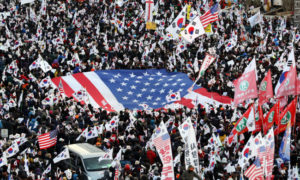Special to WorldTribune.com
 By Donald Kirk
By Donald Kirk
The sight of the American Stars and Stripes among the Taegukgi held high by loyalists to Park Geun-Hye is a reminder of the historical depth of ties among mostly aging Koreans to the country that rescued the South from annihilation by North Korea and China in the Korean War.
Some Americans, seeing their country’s flag held high by Koreans, respond with bemusement. Many of them, scholars, teachers, researchers, would not dream of flying an American flag at home. To them, the notion of waving the national flag and singing patriotic songs is antithetical to their liberal creed – identification, horrors, with all those ignoramuses who voted for Donald Trump for president.

Difficult though it may be for American intellectuals to believe anyone could appreciate the American role here quite as emotionally as do pro-Park protesters, the flag-waving does serve as evidence of the residual power of the U.S.-Korean alliance.
Presumably many Americans who witnessed the outpouring of pro-Park demonstrations in central Seoul had not imagined such a display of pro-American sentiment would be possible anywhere in a world in which anti-Americanism is a fad even among allies.
The flag-waving, pro-Park and pro-American, is likely to go on at least until the election of a new president in early May.
The sight of pro-Park sympathizers straining against police lines shielding the prosecutor’s office where she’s been questioned this week is proof enough that the crusade on her behalf, and for ties to the United States, is no passing fad. Rather, it’s a phenomenon worth considering as U.S. forces work frantically to get the first THAAD counter-missile battery in place on that Lotte golf course way south of Seoul before the election.
While anything is possible, it does seem likely that a liberal or “progressive” candidate, one from the Minjoo or Democratic Party, will be the next president.
Related: South Korean intelligence plot to purchase Peace Prize targeted the international media, March 12, 2017
Would Moon Jae-in, the Minjoo front-runner, want to tell the Americans, after the hundreds of millions of dollars expended on installing THAAD, Ok, now pack it up?
Moon, or whoever gets elected, would be more apt to engage in double-talk, to say, let’s see how THAAD works out. Another rationale would be, well, we can’t simply undo all the decisions and policies of the previous government even if the former president and her aides and best friend were thoroughly corrupt.
That’s not to say, though, that the Americans, and those pro-Park flag-lovers, may not be in for some rude shocks.
Bear in mind Rodrigo Duterte, populist president of the Philippines, who’s made a policy of undercutting the Philippine-American alliance while sucking up to China. He’s set a precedent for downplaying American ties that the next Korean president may want to emulate.
No longer can American warships dock with impunity at Subic Bay as they’d been doing with increasing regularity in recent years despite the closure of the huge U.S. naval and air bases at Subic and Clark Field north of Manila a quarter century ago. Nor will U.S. and Philippine forces conduct military exercises on such a grand scale. And U.S. advisers will not be spending so much time with Philippine forces combating the twin menaces of Muslim and Communist revolt that Duterte believes he can settle without them.
The Korean and Philippine cases are no doubt different, but the common denominator is that both countries see China as such a dominant power as to raise questions about the future of their ties with the U.S.
In the Philippines, Duterte has decided he had better get along with China in view of China’s claim to the entire South China Sea, including bases in the Spratly islands.
In the case of Korea, the next president will want to appear boldly independent and innovative, playing up to North Korea as well as China.
Inevitably we’ll hear weird and wacko proposals from foreign “analysts.” One American with delusions of expertise has suggested a “mutual freeze” – North Korea should “freeze” its nuclear program while the Americans “freeze” military exercises.
Oh great. This scholar neglected to say how anyone would check on North Korean compliance. We’ll be hearing a lot of loose talk like that after the next president takes over.
It’s safe to assume the scholar who came up with that one won’t be waving his American flag – and feels “uncomfortable” about Koreans waving theirs, American and Korean.
Donald Kirk has been covering war and peace in Asia for decades. He’s at kirkdon4343@gmail.com
